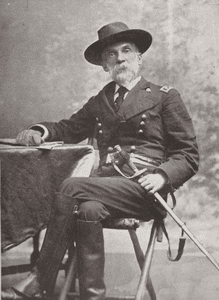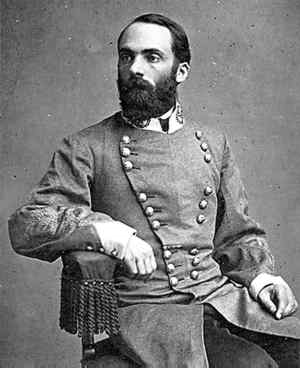Many know Confederate cavalrymen like J.E.B. Stuart, or the fierce Nathan Bedford Forrest. But Robert E. Lee believed that Confederate General Wheeler (who later served as a Major General in the U.S. Army) was one of his two best Cavalry officers.
Wheeler graduated from West Point (ironically, his lowest marks were in Cavalry Tactics). His nickname there was “Point.” (He was a small man, you see.)
After graduation, “Point” served in the Wild West. There he earned another nickname: “Fightin’ Joe.”
When his home state of Georgia seceded, Wheeler volunteered his services to the South.
Fightin’ Joe was brave. One of his men said after the war, he “warn’t afraid of nuthin’ or nobody.”
Wheeler also had a powerful sense of honor. If he thought something was his duty, no threat or obstacle mattered: 16 horses were killed under him, he survived an artillery blast and other wounds, and never quit. (He was even still riding after Appomattox.)
Cavalry often had duties to harass or delay the enemy. Wheeler’s tree-felling tactics as part of those duties resulted in another nickname, “Lumberjack Cavalry.”
It was not the last one. When they destroyed a Union gunboat, four transports and took 400 prisoners, they also became the “Horse Marines.”
Wheeler led men in over a thousand conflicts from 1861 to 1865. In 1864, he handed the Union Cavalry its worst defeat of the war.
Wheeler’s force of 5,000 cavalry whipped Sherman’s cavalry of 9,000. During the battle, the Rebels captured Union Major General Stoneman, the highest ranking Federal nabbed in the war.
Wheeler cared nothing for personal glory. Late in the war he was put under the orders of another Cavalry officer for the first time, General Hampton. When Hampton told Wheeler of the change, it is reported that his response was simply, “Certainly, General, I will receive your orders with pleasure.”
Wheeler earned the respect and affection of his men. One of them tells about an inspection.
Wheeler accompanied the inspector. One trooper did not unbutton his coat.
The inspector disapproved. Wheeler at once knew the problem and whispered to him. After
inspection, the general sent the trooper his only other shirt.
After the war, Wheeler found himself traveling on a prison boat to Fort Delaware. One of the prisoners was Jefferson Davis, accompanied by his wife and baby. During the voyage, Jeff Davis and his wife Virginia were under a lot of stress, so Wheeler spent “many an hour walking the deck with little baby Winnie.”
Wheeler became a U.S. Congressman for Alabama. When the Spanish-American War broke out, the President put him in command of a Cavalry Division. He fought in Cuba and the Philippines. Teddy Roosevelt’s Rough Riders were under his command.

Fightin’ Joe is buried at Arlington National Cemetery.

